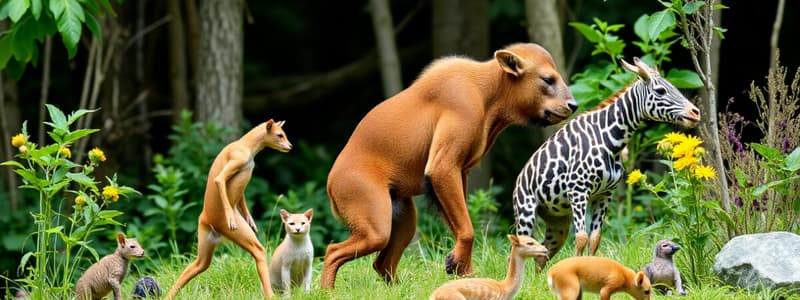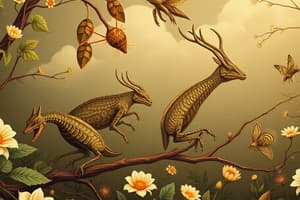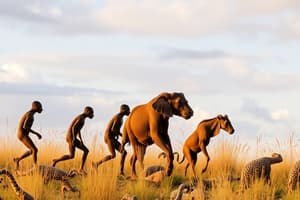Podcast
Questions and Answers
What is one of the mechanisms of biological evolution?
What is one of the mechanisms of biological evolution?
- Nuclear fusion
- Geological shifts
- Photosynthesis
- Genetic drift (correct)
According to Darwin's pillars of natural selection, what role does competition play?
According to Darwin's pillars of natural selection, what role does competition play?
- It leads to unlimited population growth without limits.
- It provides equal resources for all individuals.
- It results in selective pressures influencing which individuals survive. (correct)
- It ensures that all traits are equally beneficial.
What does the term 'heritability' refer to in the context of natural selection?
What does the term 'heritability' refer to in the context of natural selection?
- The random nature of mutations.
- The ability of traits to change rapidly.
- The passing on of traits from parent to offspring. (correct)
- The survival rates of individuals in a population.
Which statement correctly describes sexual dimorphism?
Which statement correctly describes sexual dimorphism?
Which best defines the role of genes in organisms?
Which best defines the role of genes in organisms?
What is indicated by the term 'variation' in natural selection?
What is indicated by the term 'variation' in natural selection?
How did Gregor Mendel contribute to our understanding of genetics?
How did Gregor Mendel contribute to our understanding of genetics?
Why is genetic variation important for populations?
Why is genetic variation important for populations?
Flashcards
Natural Selection
Natural Selection
The process where organisms better adapted to their environment tend to survive and produce more offspring.
Sexual Selection
Sexual Selection
A form of natural selection where traits that increase mating success, even if not directly related to survival, are favored.
Genetic Drift
Genetic Drift
Random fluctuations in allele frequencies in a population, especially in small populations.
Gene Flow
Gene Flow
Signup and view all the flashcards
Exponential Population Growth
Exponential Population Growth
Signup and view all the flashcards
Heritability
Heritability
Signup and view all the flashcards
Alleles
Alleles
Signup and view all the flashcards
Genotype/Phenotype
Genotype/Phenotype
Signup and view all the flashcards
Study Notes
Diversity of Life
- Earth is home to approximately 8.7 million species.
- Explaining this vast diversity with a coherent theory has been challenging.
- The debate about evolutionary mechanisms continues.
Mechanisms of Biological Evolution
- Natural selection
- Sexual selection
- Genetic drift
- Gene flow
- Mutation
Observations Before Darwin & Wallace
- Change occurs over time in species
- Traits appear purposeful
Darwin & Wallace's Explanatory Challenge
- Why do species change?
- How do new species arise?
- What's the function of traits?
The Origin of Species (1859) - Darwin's 3 Pillars of Natural Selection
- Competition:
- Unlimited resources lead to exponential population growth, creating a struggle for existence.
- Variation:
- Individuals vary in their ability to compete.
- Individuals with advantageous variations are selected.
- Survivors are those best adapted.
- Heritability:
- Variations are heritable, passing traits down.
- Unequal reproductive success leads to evolutionary changes in populations.
Scrutinizing Natural Selection
- Exponential Population Growth: Confirmed by evidence in various species.
- Sufficient Time: Confirmed; substantial time spans are evident in the fossil record and geological calculations.
- Heritability of Variation: Documented in numerous studies.
Sexual Dimorphism
- Some adaptations appear to have no obvious survival benefit, like extravagant plumage.
- Sexual selection, for mating advantage, accounts for such traits.
Genes
- Genes determine physical traits.
- Genes carry instructions for protein production.
- Proteins are crucial for structure and processes in living things.
- Genes are on DNA strands (deoxyribonucleic acid).
- Gregor Mendel (1865): Organisms inherit two versions of each gene (alleles).
- DNA replicates and is passed to offspring.
- Genotypes are genetic makeup.
- Phenotypes are observable traits.
Sources of Genetic Variation
- Sexual reproduction
- Mutation
- Genetic drift
- Gene flow
The Selfish Gene
- Gene is the unit of selection, not the individual or the trait.
- Genes are self-interested.
- Biological fitness measures gene replication success.
Sexual Selection
- Intersexual Selection:
- Preferential mate choice.
- Often involves female choice.
- Reflects gametic investment by one sex.
- Intrasexual Selection:
- Competition for mates.
- Status/hierarchy is a key factor.
- Physical combat or resource acquisition are common.
Evolution of the Human Species
- This topic is not detailed in the provided text.
Studying That Suits You
Use AI to generate personalized quizzes and flashcards to suit your learning preferences.




